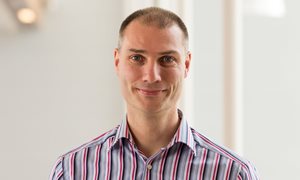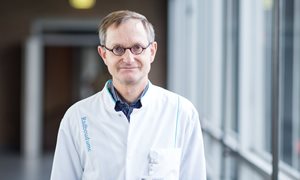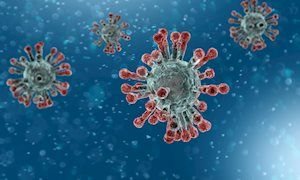14 November 2019
After incurring severe brain damage, some people suffer from prolonged Disorder of Consciousness. In that case it sometimes becomes difficult to make an accurate diagnosis. Is the patient suffering from unresponsive wakefulness syndrome (UWS), formerly referred to as a ‘vegetative state’? Or is the patient in a state of minimal consciousness? Do these people get the care they need to recover as fully as possible? And in case of death, what are the causes?
Prolonged disturbed consciousness
Because this concerns a small group of patients, reliable scientific data are scarce. As part of her doctoral study at the department of Primary and Community Care at Radboudumc and the University of Liège, the geriatric specialist and researcher Willemijn van Erp wanted to change that situation. Van Erp, who specializes in the most severe outcomes of non-congenital brain damage, in particular prolonged Disorder of Consciousness, visited as many patients as possible to assess their situation as objectively as possible.
Diagnostics and rehabilitation
Van Erp achieved remarkable results: “Among 31 patients in the Netherlands who were suffering from unresponsive wakefulness syndrome (UWS) between 2012 and 2018, almost 80% did not receive a correct diagnosis upon discharge from the hospital. Only one patient had access to specialized rehabilitation. The risk of mortality was high, especially in the first two years after brain damage. In half of the patients with UWS who died, their death followed the cessation of artificial nutrition and hydration. Although death was usually peaceful after such a decision, it could sometimes take up to 18 days before the patient died. Some families therefore requested the physician to perform euthanasia for their loved one, but such requests cannot be granted within the prevailing regulations.”
Discontinuation of life-prolonging treatment
According to Van Erp and her Dutch and Belgian colleagues, the study makes it clear that there is still much room for improvement in the Netherlands for this small but severely affected group of patients. Relatively few patients suffer from UWS in the Netherlands, so practitioners and physicians often do not have access to specialized knowledge. Van Erp: “This results in fragmented care with sub-optimal treatment options. In that context, physicians and loved ones are more likely to cease the life-prolonging treatment, which usually involves artificial nutrition and hydration. As a result, even fewer patients remain, and the surviving group has even less chance of receiving appropriate care leading to recovery. We must break out of this vicious circle.”
Taking steps
Compared to other countries, the Netherlands has already taken some important steps in this area, the authors note. For example, Radboudumc has established a special research group for this patient group, which since 2016 has been linked to the EENnacoma expertise network (expertise network on severe non-congenital brain damage after coma). Van Erp: “The Netherlands is making progress in caring for patients with prolonged Disorder of Consciousness. Since January 2019, health insurers have reimbursed Early Intensive Neurorehabilitation Programs (EINP) also for patients from 25 years of age. That is another big step forward.” At Libra Rehabilitation and Audiology at Het Leijpark in Tilburg, the only facility in the Netherlands that provides this treatment, patients from all over the country can be diagnosed with prolonged Disorder of Consciousness. According to Van Erp, who performs this diagnosis, “Preventing misdiagnoses and optimally facilitating rehabilitation are prerequisites for appropriate decision-making in the case of unresponsive wakefulness syndrome. Before you make major decisions about extending the life of a loved one with UWS, you first want to know what exactly is going on and what the prospects are. Through good collaboration between physicians, researchers and policy makers, we must and can ensure that patients suffering from prolonged Disorder of Consciousness and their families do not get lost in our care system.”
Willemijn van Erp is member of theme Healthcare improvement science.

After incurring severe brain damage, some people suffer from prolonged Disorder of Consciousness. In that case it sometimes becomes difficult to make an accurate diagnosis. Is the patient suffering from unresponsive wakefulness syndrome (UWS), formerly referred to as a ‘vegetative state’? Or is the patient in a state of minimal consciousness? Do these people get the care they need to recover as fully as possible? And in case of death, what are the causes?
Prolonged disturbed consciousness
Because this concerns a small group of patients, reliable scientific data are scarce. As part of her doctoral study at the department of Primary and Community Care at Radboudumc and the University of Liège, the geriatric specialist and researcher Willemijn van Erp wanted to change that situation. Van Erp, who specializes in the most severe outcomes of non-congenital brain damage, in particular prolonged Disorder of Consciousness, visited as many patients as possible to assess their situation as objectively as possible.
Diagnostics and rehabilitation
Van Erp achieved remarkable results: “Among 31 patients in the Netherlands who were suffering from unresponsive wakefulness syndrome (UWS) between 2012 and 2018, almost 80% did not receive a correct diagnosis upon discharge from the hospital. Only one patient had access to specialized rehabilitation. The risk of mortality was high, especially in the first two years after brain damage. In half of the patients with UWS who died, their death followed the cessation of artificial nutrition and hydration. Although death was usually peaceful after such a decision, it could sometimes take up to 18 days before the patient died. Some families therefore requested the physician to perform euthanasia for their loved one, but such requests cannot be granted within the prevailing regulations.”
Discontinuation of life-prolonging treatment
According to Van Erp and her Dutch and Belgian colleagues, the study makes it clear that there is still much room for improvement in the Netherlands for this small but severely affected group of patients. Relatively few patients suffer from UWS in the Netherlands, so practitioners and physicians often do not have access to specialized knowledge. Van Erp: “This results in fragmented care with sub-optimal treatment options. In that context, physicians and loved ones are more likely to cease the life-prolonging treatment, which usually involves artificial nutrition and hydration. As a result, even fewer patients remain, and the surviving group has even less chance of receiving appropriate care leading to recovery. We must break out of this vicious circle.”
Taking steps
Compared to other countries, the Netherlands has already taken some important steps in this area, the authors note. For example, Radboudumc has established a special research group for this patient group, which since 2016 has been linked to the EENnacoma expertise network (expertise network on severe non-congenital brain damage after coma). Van Erp: “The Netherlands is making progress in caring for patients with prolonged Disorder of Consciousness. Since January 2019, health insurers have reimbursed Early Intensive Neurorehabilitation Programs (EINP) also for patients from 25 years of age. That is another big step forward.” At Libra Rehabilitation and Audiology at Het Leijpark in Tilburg, the only facility in the Netherlands that provides this treatment, patients from all over the country can be diagnosed with prolonged Disorder of Consciousness. According to Van Erp, who performs this diagnosis, “Preventing misdiagnoses and optimally facilitating rehabilitation are prerequisites for appropriate decision-making in the case of unresponsive wakefulness syndrome. Before you make major decisions about extending the life of a loved one with UWS, you first want to know what exactly is going on and what the prospects are. Through good collaboration between physicians, researchers and policy makers, we must and can ensure that patients suffering from prolonged Disorder of Consciousness and their families do not get lost in our care system.”
Willemijn van Erp is member of theme Healthcare improvement science.
Related news items

More than five million euros for research to improve palliative care Jeroen Hasselaar will lead research project with Horizon grant
15 June 2022 Jeroen Hasselaar will lead a large international research project. With a 5.3 million euro grant from the EU's Horizon program, he and his team want to improve palliative care for cancer patients, together with partners from nine European countries. go to page
Most COVID-19 ICU survivors experience symptoms one year after ICU admission Publication in JAMA
25 January 2022 75% of the COVID-19 survivors who were treated in the Intensive Care Unit (ICU) experience physical, mental and/or cognitive problems one-year post ICU. This shows the large-scale MONITOR-IC study led by Radboudumc. go to page
1.4 million euro to reduce hospital admissions due to medication
7 January 2022 A team of sixteen Dutch hospitals received a grant of 1.4 million euros from ZonMw. They will investigate whether they can reduce medication related hospital readmissions. go to page
Participating in cancer research among people with intellectual disabilities
30 November 2021 Thanks to the support of the Maarten van der Weijden Foundation research was carried out into the participation of people with intellectual disabilities in (population) screening for cancer. go to page

